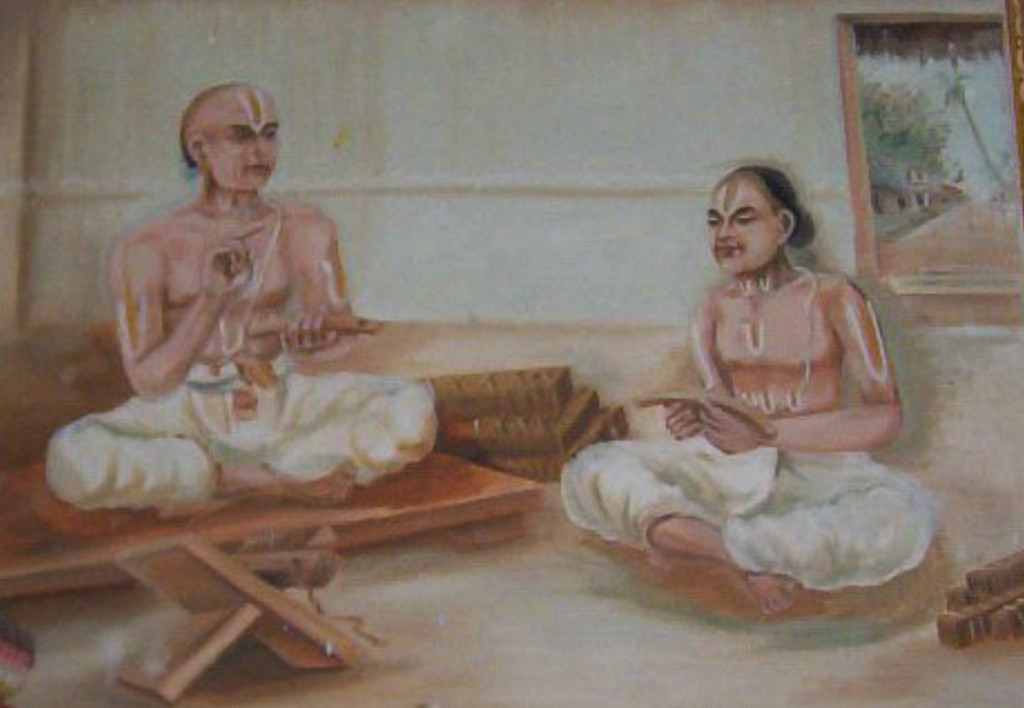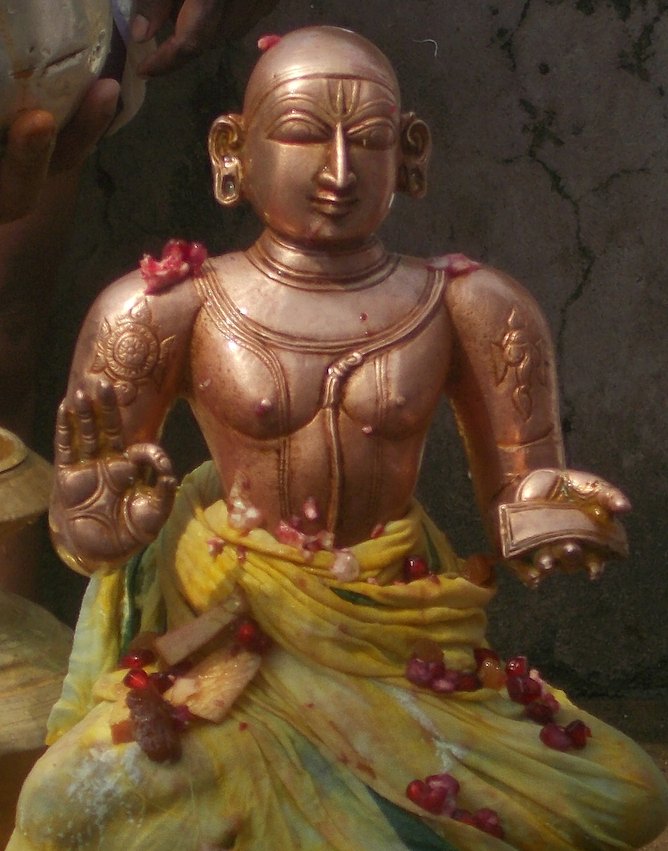Article by Sri Sadagopan Iyengar Swami, Coimbatore
Though the relationship between an uncle and his nephew is something so unique that no uncle would ever let his nephew come to grief, there is indeed a case where the uncle was all-powerful, but failed to save his nephew. Subhadra was the beloved sister of Sri Krishna and married Arjuna. Abhimanyu was the precious child born of this wedlock and looked every bit equal to Arjuna, when he came into the full bloom of youth. His brilliance as a warrior, his unquestionable bravery and absolute lack of fear made him the darling of his soldiers and the envy of even mature warriors. Abhimanyu was quite proud to have Sri Krishna as his maternal uncle and when surrounded by eminent fighters, flaunted his relationship with Krishna, denying any fear at having to face, single-handed, the best of warriors the Kourava army had to offer. Even in the face of such a concerted challenge, Abhimanyu never stepped back, fought valiantly and died a hero’s death. The pity was that though Sri Krishna was in the same battlefield, He could not or would not save His beloved nephew, who had such pride in his uncle, realizing that He was none other than the Paramatma-
“Api Visvajitam Vishnum maatulam praapya sootaja!
Pitaram cha Arjunam sankhye na bhee:maam upayaasyati”
“How can fear even touch me, who has Sri Mahavishnu Himself for an uncle and with a father of the caliber of Arjuna!” proclaims Abhimanyu proudly.
Having seen the Mahabharata Yuddham where uncles and nephews fought and killed each other, shall we look at another famous pair of uncle and nephew, who were initially extremely close , but fell out for a brief period, going to the extent of inflicting everlasting damage on each other. Devarshi Narada had a nephew by name Parvata, who too was equally learned and a Maharshi. The two Rishis, seeking a respite from their daily routine of prayer and penance, came to Bhoolokam for a brief sojourn. During the trip down to earth, they made a mutual pact-each should disclose to the other whatever thoughts arose in his minds, good or bad. The couple went to King Srinjaya, who welcomed them, made them comfortable and requested them to spend some time in his palace. He deputed his beautiful daughter Sukumaari to take care of the two Rishis.
“Balavaan indriya graama: vidvaamssapi karshati”-so goes the adage, pointing out that our sensory organs are indeed powerful, difficult to tame, and even the wisest of men falls a prey to these senses. True to this, Narada was attracted by Sukumari. However, eaten away by shame, he did not disclose this to his nephew, who, despite being younger, was apparently unaffected by the company of a beautiful female.
Love, as you know, is extremely difficult to hide, especially from those who are near and dear to you. Parvata could thus easily find out that Narada was in love with Sukumari. Rishis are normally extremely docile people, but once they feel that Dharma has been violated, their anger gets the better of them. Enraged at Narada not honouring their mutual agreement of sharing confidences, Parvata immediately cursed him. He told Narada, “Despite being so learned, you have failed to keep your word and have hidden from me your feelings towards Sukumari. You will definitely marry her. However, after marriage, whenever she or her parents look at you, they would not see the serene face of a Deva Rishi, but only that of a monkey. You would be your own self, but would appear to others as a vaanaram.” Dismayed at this rather cruel curse, Narada too cursed young Parvata that he would never ascend to heaven, despite all his meritorious deeds and penance. Narada duly married Sukumari, but the latter, true to her sterling qualities, was not put off by the ugly countenance of her husband that confronted her. Accepting her lot with philosophical resignation, she continued to serve Narada as before. Parvata left in a huff on his own, to roam over hill and dale, ruing at leisure what he did in a hurry. Providentially, uncle and nephew met in a forest in the course of their wanderings and Parvata expressed his regret to Narada, praying to him to lift his curse. Reconciling their differences, the two Maharshis nullified their shaapams against each other, restoring status quo ante.
Till I came across this episode in Mahabharata, I had been, and perhaps many of you might have been, under the impression that Narada Maharshi was a confirmed bachelor. Anyway, that was another famous pair of uncle and nephew.
Leaving Puraanic times and coming to our own, we find that the special relationship of uncles and nephews has sustained over the ages. Let us go back just a thousand years from now and consider another avuncular bond.
Ramanujan is a house-hold word, as far as Sri Vaishnavites are concerned. There would indeed be none who doesn’t know the Acharya or has at least heard his haloed name. If we are what we are today, if our Sampradaayam has withstood the onslaught of alien forces time and again and flourished, we owe it in no small measure to Ramanuja. The very mention of this magical name prompts in us all good thoughts. Do you know who gave this beautiful name to the Prince of Saints? Immediately upon a child being born to Sri Kesava Somayaaji and Sri Kaantimati at Sri Perumboodoor, it was the child’s uncle Sri Saila Poorna (Periya Tirumalai Nambi) who rushed from his abode at Tirumala, saw with wonder the divine features of the new-born and gave him the name “Ilayaazhwaan” (referring to Lakshmana, which is a synonym for Ramaanuja). From this episode, we come to know that it was the uncle’s right and duty those days to name the new-born children. And we must say that Nambi had the perspicacity to give Ramanuja the most suitable of names, for, like Lakshmana, Ramanuja too went on to perform varied and wide-ranging services to the Lord. It was from Sri Tirumalai Nambi (who, in turn, was the disciple of Sri Alavanadar) that Sri Ramanuja learnt the esoteric purport of Srimad Ramayanam, staying at Tirumala for over a year.
Srisaila Poorna had not only Ramanuja as nephew. Another sister of his, married to Kamala Nayana Bhaatar, gave birth to a son, who was named Govindan. This Govindan became a classmate of Ramanuja at Yaadavaprakaasa’s gurukulam and saved his cousin from the evil designs of the guru, who was eaten away by envy at the growing wisdom and popularity of his disciple Ramanuja.
Govindan, however, was led astray by Yaadavaprakaasa and became an ardent devotee of a demi-god. It was his uncle Tirumalai Nambi who reasoned with him for long, convinced him of the supremacy of Sriman Narayana and brought him back to the faith. After instructing him in the sacred tenets of the Sampradaayam, Tirumalai Nambi handed Govindan over to Ramanuja. In course of time, Govindan became Embaar, ripe in gnaanam and anushttaanam, devoted beyond measure to Ramanuja.
We thus see that it was an uncle again, who was responsible for two of his nephews becoming mighty spiritual leaders, whose fame is still growing, a thousand years after their departure from this earth.
Sri Ramanuja had another special relationship, this time with his own nephew, Mudaliaandan. When he had to take vows of renunciation upon becoming a Sanyaasi, Ramanuja is reported to have said, “I renounce everything except Daasarathi (another name of Mudaliyaandan)”. So close did he consider Mudaliyaandan and so valuable his contribution to the Sampradayam, that Ramanuja was not willing to sacrifice such a disciple. The proximity that Mudaliyaandaan enjoyed to Ramanuja can be gauged by the fact that he was considered to be Yatiraja’s tridandam.
This essay has grown long and I can hear readers remark, “Enough of uncles!”. Well, permit me to chronicle just one more such relationship-I assure you that it would be the last, but by no means the least and that you would be glad at having stayed with me so far.
The greatest of Acharyas, a Peerless Preceptor to whom all of us owe our existence as Vaidikas and Vaishnavas, without whose immeasurable contribution our Sampradayam would have been wiped out and who has passed on to us the quintessence of Ramanuja’s thoughts-let me cut short the encomiums and say simply that I am talking about Swami Desikan. All the greatness of Swami Desikan can be attributed to a single source-his uncle, Sri Aatreya Ramanuja, also known as Kidaambi Appullaar. It was Sri Appullaar who took the young Venkatanaatha under his wing and taught him all that was required to be known in the scripture, all by the age of 20-
“Ramanujaat Atreyaat maatulaat sakalaa: kalaa:
avaapya vimsatyabde ya: tasmai praagyaaya mangalam”
It was again Sri Appullaar who instructed Swami Desikan in the powerful Garuda Mantram, through the recitation of which Swami Desikan obtained the boundless blessings of Garutmaan and through that, the anugraham of Sri Hayagreeva. Swami Desikan remembers with everlasting gratitude his uncle’s contribution in his development and likens himself to a mere parrot, repeating whatever was taught by Sri Appullaar out of his infinite mercy for his nephew-
“Kidaambi Appullaar adiyenai kiliyai pazhakkumaa pole pazhakki vaikka, avar tiru ullatthil irakkam adiyaaga Perumal teliya prakaasippitthu, maravaamal kaatthu, pizhayara pesuvittha paasurangal”
Let us end this piece here, with this distinguished nephew’s tribute to his illustrious uncle. I can hear someone remark, “What about aunts? The essay is titled “Of uncles and aunts”, isn’t it?”. Well, if uncles have made me wax so long, Aunts would definitely require a separate piece, entirely devoted to them, which I shall deal with later.










Nice article to know about the uncles of our great beloved acharyas.. It is very distinct about the Sage Narada and his uncle.. Please continue this relationship kind of article series.
Enjoyed reading this informative study of mamas.No wonder a mama is accorded the status of Acharyan
B -ful article .conclued with our AAchariyan Swami Desikan. thanks .